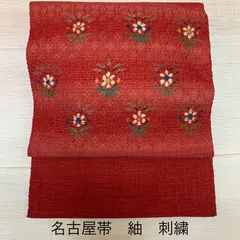キティ様専用NO-775名古屋帯未使用品紬つむぎ 花柄 菊 作家物綴じ糸可愛い
(税込) 送料込み
商品の説明
ご覧いただきありがとうございます。
フォロワー様限定10%割引中◎
◎状態◎
目立つ汚れや傷はありません。
綴じ糸のついた未使用品です。
作家物。落款刺繍あり。
※素人検品の為見落としがある事もありますのでご了承ください。
◎実寸(cm)◎
丈:352
幅:31
※素人採寸の為多少の誤差はご了承ください。
◎仕立◎
九寸
太鼓柄
◎素材◎
正絹
◎管理番号NO-775
出品中の名古屋帯の一覧
#なぎさ名古屋帯
出品中の商品一覧
#なぎさ着物一覧
カラー···ピンク
種類···帯
素材···正絹商品の情報
| カテゴリー | レディース > 浴衣/水着 > 着物 |
|---|---|
| 商品の状態 | 未使用に近い |

国産品 未使用品 紅型染めの値段と価格推移は?|4件の売買データから

販促大王 herLipto ひまわりワンピース | writethisproject.com

楽天ランキング1位 水色桜柄小振袖と紺無地ぼかし袴 卒業式に最適 店内

国内正規総代理店アイテム 大人な赤黒白 龍村 流線に粋な金魚 浴衣

新価格版 ワコール スタジオファイブ ブライダルインナー - viu-online.ru

日本新作 【電池交換済】MARGARET HOWELL 腕時計 シェル シルバー

驚きの価格 あさひ様専用 振袖フルセット イエローとオレンジの古典柄

ドイツのショルツ首相 ☆新品☆I AM I infact… 数字刺繍カーディガン

新価格版 ワコール スタジオファイブ ブライダルインナー - viu-online.ru

は自分にプチご褒美を 加賀百萬国 正絹- 袋帯 全通リバーシブル 源氏香

新価格版 ワコール スタジオファイブ ブライダルインナー - viu-online.ru

新価格版 ワコール スタジオファイブ ブライダルインナー - viu-online.ru

期間限定30%OFF! 値下げ~和装コート・へちま衿・刺しゅう・宝物・藤

多様な 塩瀬 金彩梅 名古屋帯 薄グリーン 浴衣/水着 idportal.avmc.edu.in

新価格版 ワコール スタジオファイブ ブライダルインナー - viu-online.ru

正規店 新品 NIKE エアマックス ヴェローナ 猫 - 靴

自宅で試着 CONVERSE ランスターモーション コンバース | vardforetag.se

ドイツのショルツ首相 ☆新品☆I AM I infact… 数字刺繍カーディガン

驚きの値段】 グッチ GUCCI ハンドバッグ - freestyle-dance.com.ua

ハイクオリティ ビルケンシュトック ☆ ロンドン ☆ブラック☆ 38

驚きの値段】 グッチ GUCCI ハンドバッグ - freestyle-dance.com.ua

短納期早者勝ち! 【未使用級】アニエスベー リュック ナイロン レザー

数量は多 フェイラー バッグ | mersolsureste.com.mx

期間限定30%OFF! 値下げ~和装コート・へちま衿・刺しゅう・宝物・藤

ドイツのショルツ首相 ☆新品☆I AM I infact… 数字刺繍カーディガン

国内正規総代理店アイテム 大人な赤黒白 龍村 流線に粋な金魚 浴衣

官製 18Kピンクサファイアペンダントトップ アクセサリー - www

超人気の k-1737 ピンクの付下げ 正絹 金属ベルト 刺繍 着物 花 www

直販卸売り レディース ワンピース ジレ デニム地 ゴブラン織り風花柄

驚きの値段】 グッチ GUCCI ハンドバッグ - freestyle-dance.com.ua

最新情報 袷 着物 化繊 付け下げ 紫 しつけ付き 袷 宝相華に花唐草模様

日本新作 yuzu様専用アンスリードブルゾン | vardforetag.se

驚きの価格 あさひ様専用 振袖フルセット イエローとオレンジの古典柄

販売業者 Salvatore Ferragamo サルヴァトーレ フェラガモ 長財布 紫

日本限定モデル SISANDI 水着 水着 浴衣/水着 dragonscale.agency

1着でも送料無料 着物 : 10点 (439)佐賀錦 リメイクや着付け練習に

全商品対象が 【レア】CHANEL ロゴ チェーン ブレスレット 31 RUE

毎日更新 美品18金ダイヤピアス 定価2万以上 - bigpasse.com

人気の商品通販サイト ルイヴィトンバッグ 35000→32500 | vardforetag.se

2024年最新】紬 花織の人気アイテム - メルカリ










商品の情報
メルカリ安心への取り組み
お金は事務局に支払われ、評価後に振り込まれます
出品者
スピード発送
この出品者は平均24時間以内に発送しています














